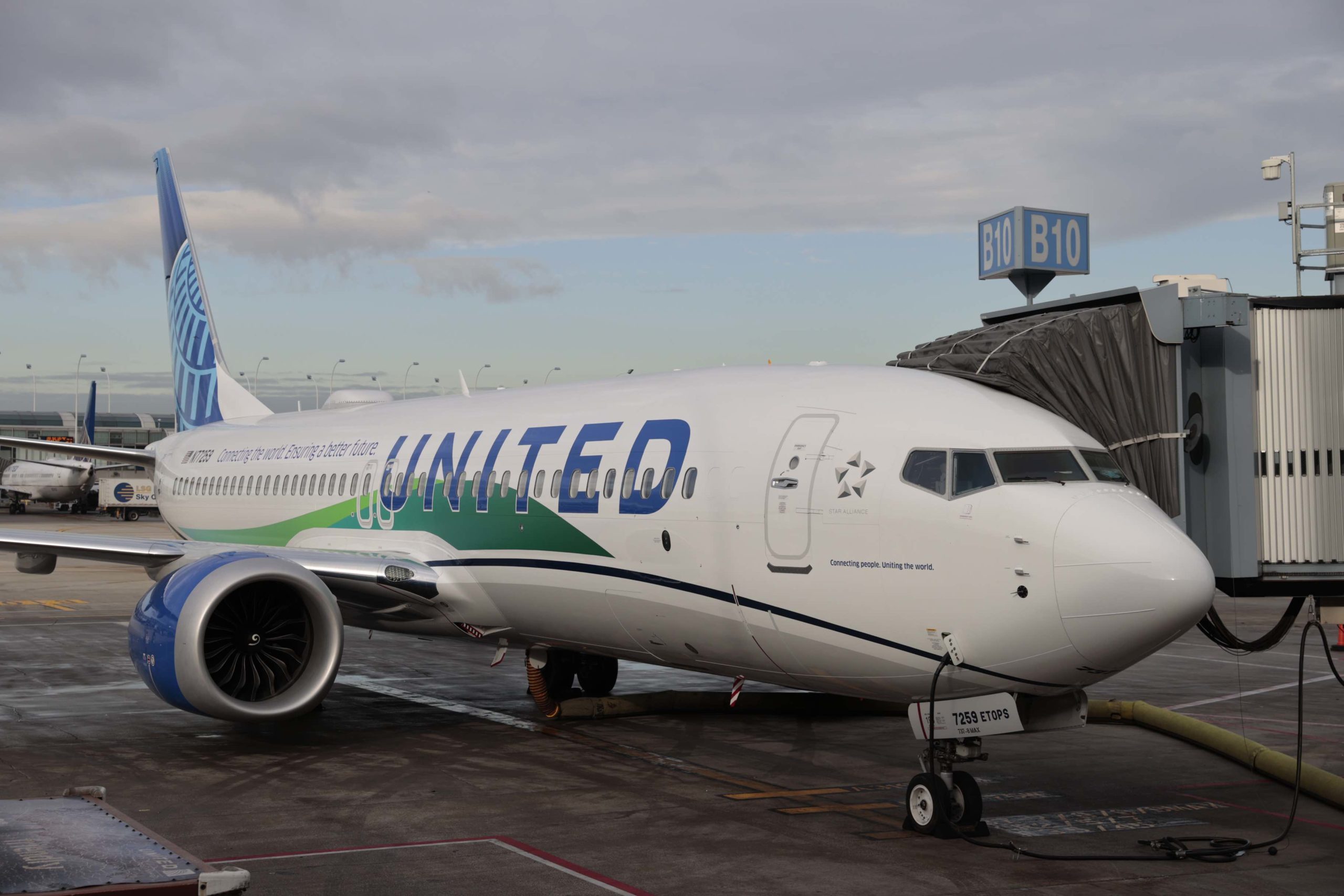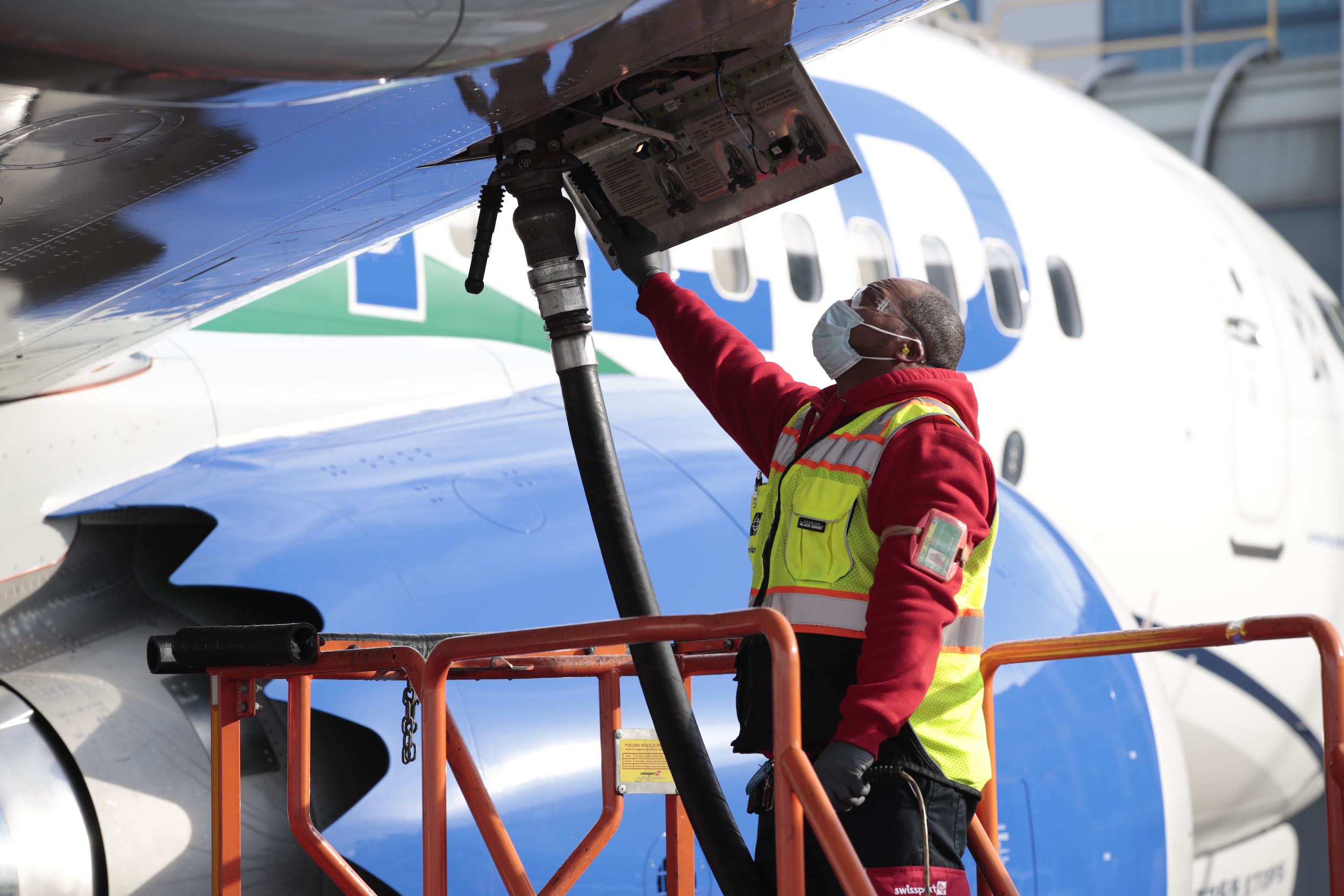
United Airlines made history on Wednesday by operating the world’s first-ever passenger flight using 100% sustainable aviation fuel (SAF).
United Airlines Flies First Flight With 100% Sustainable Aviation Fuel + Passengers Onboard
The flight took off from Chicago O’Hare (ORD) and traveled to Washington National (DCA) with CEO Scott Kirby onboard. United is headquartered in Chicago and its flight to the preferred airport of Washington lawmakers and lobbyists was not coincidental. Kirby has built up quite an insider profile in the U.S. capital district thanks to his action on climate change and his early COVID-19 vaccine mandate for employees.
United has been mixing jet fuel and conventional fuel since 2016, but yesterday’s flight marked the first time it has exclusively used SAF in one engine. Yesterday’s flight took off with more than 100 passengers onboard with fuel supplied by World Energy, the only commercial biofuel producer in the USA.

The flight was operated by a Boeing 737 MAX 8 with 500 gallons of SAF in the right engine and 500 gallons of conventional fuel in the left engine. While federal limits currently prohibit airlines from using exclusively SAF, United obtained a special exemption for this “test” flight. While United boasts that SAF used can be mixed with conventional fuel or used on its own, it noted that splitting up the amount of fuel used evenly demonstrated the two fuels can be used concurrently with no operational issues.
Kirby said:
“Today’s SAF flight is not only a significant milestone for efforts to decarbonize our industry, but when combined with the surge in commitments to produce and purchase alternative fuels, we’re demonstrating the scalable and impactful way companies can join together and play a role in addressing the biggest challenge of our lifetimes.”
United claims it has bought nearly double the amount of SAF than all other worldwide carriers combined. Gene Gebolys, CEO of World Energy, notes that there will need to be more purchase volume in order for prices to come down:
“When we fly, we connect, and our demand for the connections aviation makes possible are only going to grow. But we need to develop affordable, high energy density, low-carbon liquid fuels at scale everywhere to allow those connections to be made sustainably.
“The pioneering work is the hardest work, and United has been with us from the very start. The flight path ahead will require tremendous teamwork. We are fortunate to have partners like United to do that work and are thrilled to be a part of this important milestone today.”
United, which has pledged to be carbon neutral by 2050 without purchasing carbon offsets, has purchased 1.5 billion gallons of additional SAF.
CONCLUSION
As laudatory as United’s historic flight was, United’s ambitious net-zero carbon goal will remain difficult unless conventional aviation fuel goes way up in price or SAF comes down (or is subsidized, hence the DCA destination). While United has taken an early lead toward carbon neutrality, it must recruit other airlines to join its quest…and offset some of the high development costs. Rome wasn’t fueled in a day…
images: United Airlines




I’m sure a lot of people will make fun of the fact that it was only used in one of the engines, but as a demonstration, this is a big step for sustainability. Good for UA.
Is SAF something we should be striving for? According to one source, SAF relies on byproducts of industries that are linked to high greenhouse emissions and environmental harm. Moreover, there’s not enough of it to scale up. By using these sources as biofuels for aviation, it puts a strain on other resources. Also, doesn’t burning SAF in the engine lead to carbon emissions? This feel-good publicity flight seems rather silly, IMHO.
Having said that, I like the green wave on the fuselage! United should make that change fleetwide.
SAF is the only way for airplanes to hit the carbon goals in the near future (10-20 years). Electric and hydrogen powered planes are severely limited in payload and range, both would have to take an exponential leap to become technologically viable and it would take another exponential leap to become commercially viable.
I thought Virgin Atlantic do this in 2018.
Anyone know why United #47 was diverted yesterday (1 December) to Gander on its way to IAH from FRA?
I would guess fuel or medical emergency. I can ask.
This is a farce. Sustainable fuels require so much energy input to make that there is less pollution overall with traditional aviation fuels. The resources used to produced sustainable fuels would more efficiently be applied elsewhere.
Airlines should admit that aviation is one area that requires traditional fuel for the foreseeable future. Everyone wants a Tesla and all vehicles will be electric one day but anything larger than a twin piston won’t. It’s just not feasible to build a commercial passenger jet that doesn’t lose weight as it flies.